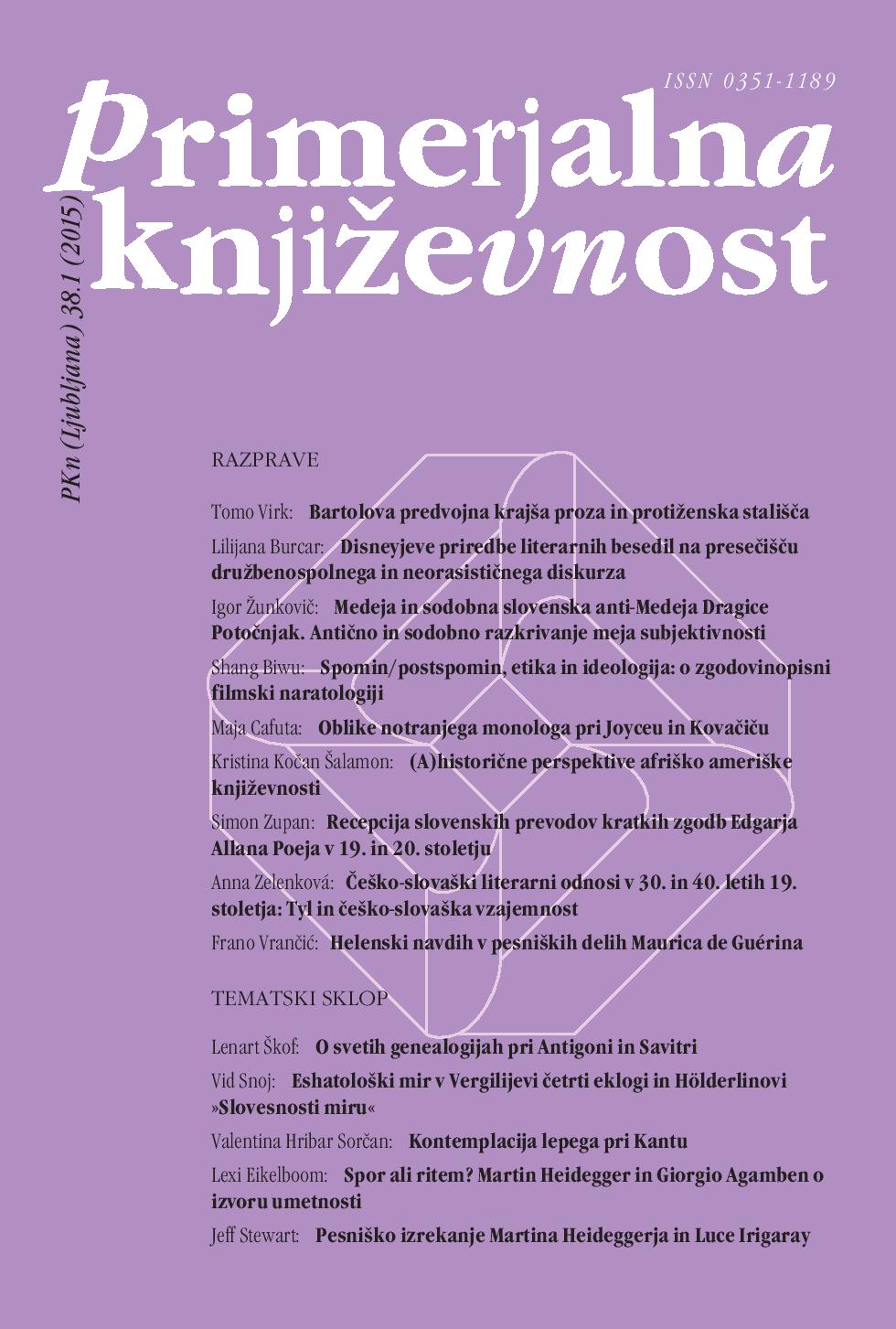Eschatological Peace in Virgil’s Fourth Eclogue and in Hölderlin’s “Friedensfeier”
Keywords:
Latin poetry, Virgil, German poetry, Hölderlin, Friedrich, eschatology, peaceAbstract
Virgil’s “Fourth Eclogue” and Hölderlin’s “Friedensfeier” (“Celebration of Peace”) display a number of parallels. Both poems were occasioned by historical events, by the Treaty of Brundisium in 40 BC and by the 1801 Treaty of Lunéville, respectively. The enigmatic central figures of both have often been interpreted as historical figures: Virgil’s child (puer) as the son of a Roman consul, and Hölderlin’s prince of the feast (Fürst des Festes) as the first Consul of the French Republic, Napoleon Bonaparte. Moreover, both poets weave into their poems the myth of the Golden Age, eschatologizing it in the process. Their poetic visions transform the cyclical returning of the Golden Age into a final return, which marks the advent of eschatological peace: peace in nature, between animals, as well as peace and reconciliation between men and gods. However, “Friedensfeier” introduces an additional type of reconciliation: reconciliation between the gods themselves. It is by these means that Hölderlin’s heterodox Christianity abolishes both the patristic euhemeristic hominization of the ancient gods and their demonization. This reconciliation is evoked in the image of an eschatological feast as the renewed presence of the ancient gods and of Christ, the son that reconciles other sons of God to himself and to each other, as well as the unique presence of the hitherto unrevealed Father.References
Allemann. Beda. Hölderlins „Friedensfeier“. Pfullingen: Günther Neske, 1955.
Baldry, H. C. »Who Invented the Golden Age?« The Classical Quarterly 2.1–2 (1952): 83–92.
Bourne, Ella. »The Messianic Prophecy in Vergil’s Fourth Eclogue«. The Classical Journal 11.7 (1916): 390–400.
Bröcker, Walter. Hölderlins „Friedensfeier“ entstehungsgeschichtlich erklärt. Frankfurt ob Majni: Vittorio Klostermann, 1960.
Callimachus – Lycophron – Aratus. Grški izvirnik z angleškim prevodom. London: William Heineman, in New York: G. P. Putnam’s Sons, 1921 (The Loeb Classical Library).
Freund, Stefan. Vergil im frühen Christentum. Untersuchungen zu den Vergilzitaten bei Tertullian, Minucius Felix, Novatian, Cyprian und Arnobius. Paderborn itn.: Ferdinand Schöningh, 2003 (2., popravljena in razširjena izdaja).
Heidegger, Martin. »Hölderlin in bistvo pesništva«. Prev. Vid Snoj. Razjasnjenja ob Hölderlinovem pesništvu. Ljubljana: Nova revija, 2001. 33–47.
Hölderlin, Friedrich. Hölderlin. Prev. Niko Grafenauer. Ljubljana: Mladinska knjiga, 1978 (Lirika 41).
– – –. Gedichte. Izd. Jochen Schmidt. Frankfurt ob Majni: Insel Verlag, 1984.
– – –. Pozne himne. Prev. Vid Snoj. Ljubljana: KUD Logos, 2006 (Poezije 2).
– – –. Sämtliche Werke. Grosse Stuttgarter Ausgabe [= SW]. 6. zv.: Briefe. Izd. Friedrich Beissner. Stuttgart: Kohlhammer, 1958.
Kant, Immanuel. »O večnem miru. Filozofski osnutek«. Zgodovinsko-politični spisi. Ur. Rado Riha. Ljubljana: Založba ZRC, ZRC SAZU, 2006. 87–131.
Kerényi. Karl. Vergil und Hölderlin. Zürich: Rhein Verlag, 1957.
Nisbet, R. G. M. »Virgil’s Fourth Eclogue: Easterners and Westerners«. Bulletin of the Institute of Classical Studies 25 (1978): 59–77.
Norden, Eduard. Die Geburt des Kindes. Geschichte einer religiösen Idee. Leipzig in Berlin: B. G. Teubner, 1924.
Oppermann, Hans (ur.). Wege zu Vergil. Darmstadt: Wissenschafltiche Buchgesellschaft, 1966.
Du Quesnay, Ian M. le M. »Vergil’s Fourth Eclogue«. Papers of the Leeds International Latin Seminar 2 (1977): 25–99.
Schmidt, Jochen. Hölderlins geschichtsphilosophische Hymnen „Friedensfeier“ – „Der Einzige“ – „Patmos“. Darmstadt: Wissenschafltiche Buchgesellschaft, 1990.
Scott Ryberg, Inez. »Vergil’s Golden Age«. Transactions and Proceedings of the American Philological Association 89 (1958): 112–131.
Snoj, Vid. »Vergil und die westliche Überlieferung«. Acta neophilologica 38.1–2 (2005): 129–138.
Szondi, Peter. „Friedensfeier“. Einführung in die literarische Hermeneutik. Ur. Jean Bollack in Helen Stierlin. Frankfurt ob Majni: Suhrkamp, 1975. 324–402.
Vergilij Maro, Publij. Bukolika in Georgika. Prevedel Fran Bradač. Maribor: Založba Obzorja, 1964.
– – –. Eclogues / Georgics / Aeneid I–IV. Latinski izvirnik z angleškim prevodom. London: William Heineman, in New York: G. P. Putnam’s Sons, 1921 (The Loeb Classical Library).
– – –. Eneida. Prevedel Fran Bradač. Maribor: Založba Obzorja, 1964.
– – –. Publij Vergilij Maro. Prev. Marko Marinčič. Ljubljana: Mladinska knjiga, 1994 (Lirika 79).


